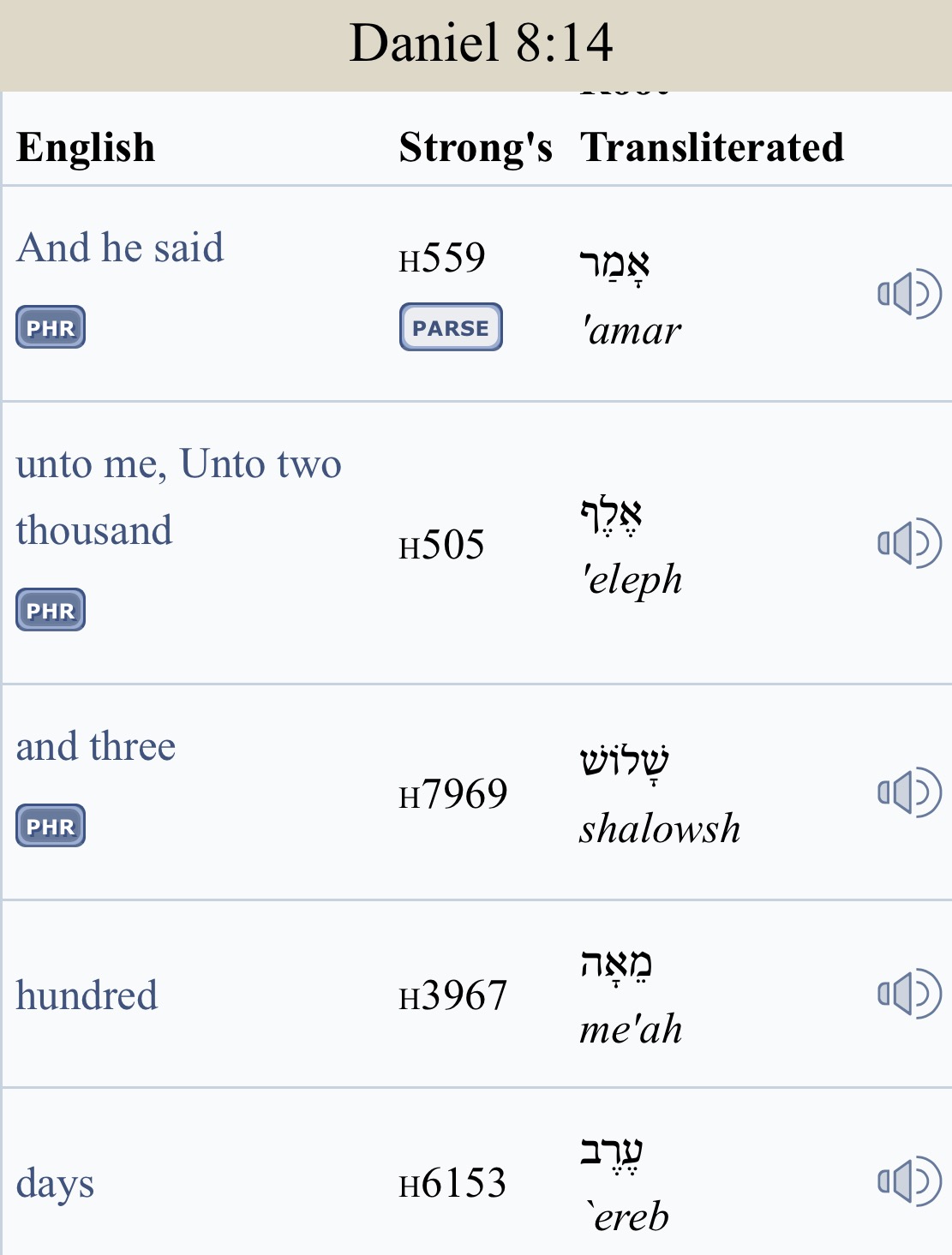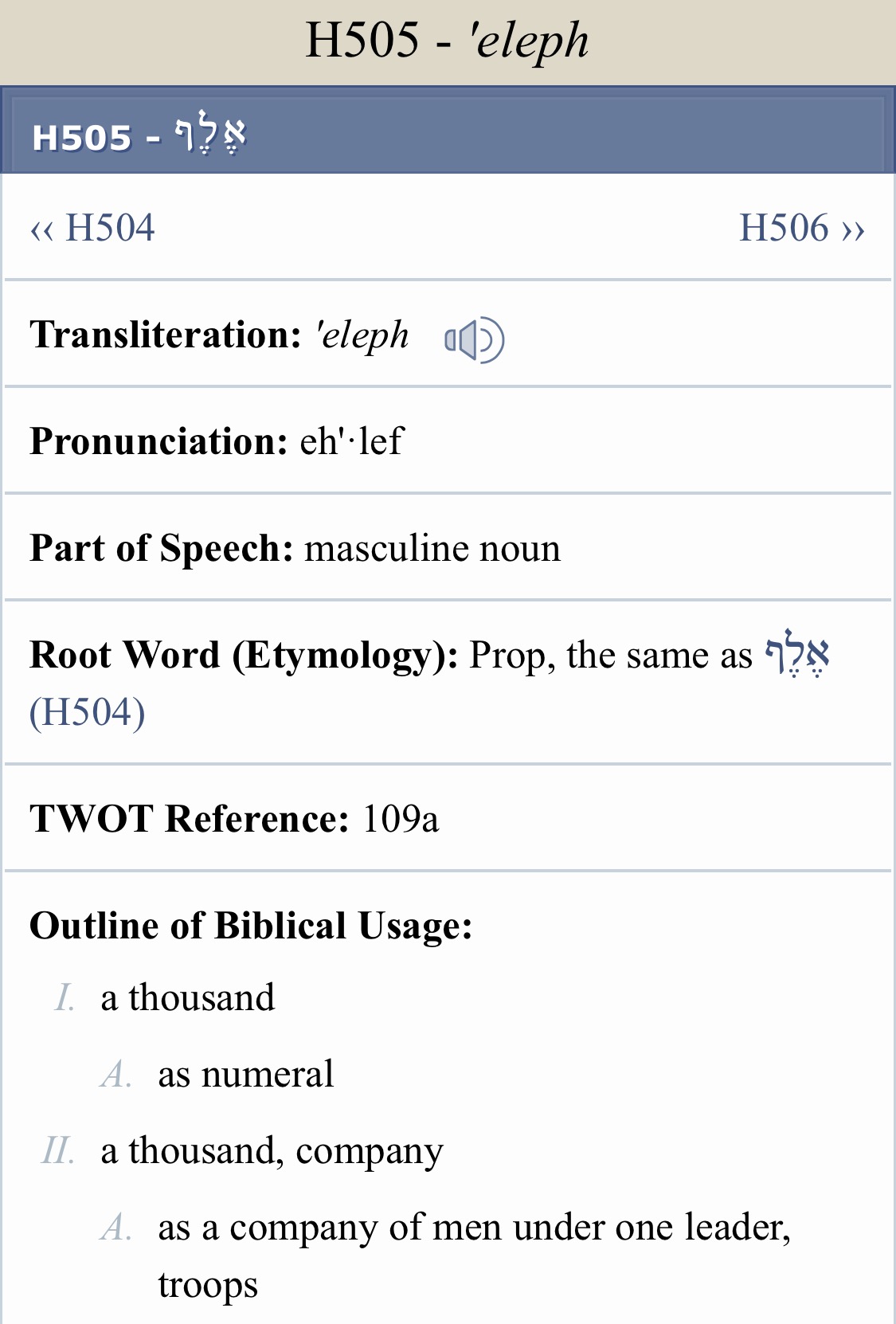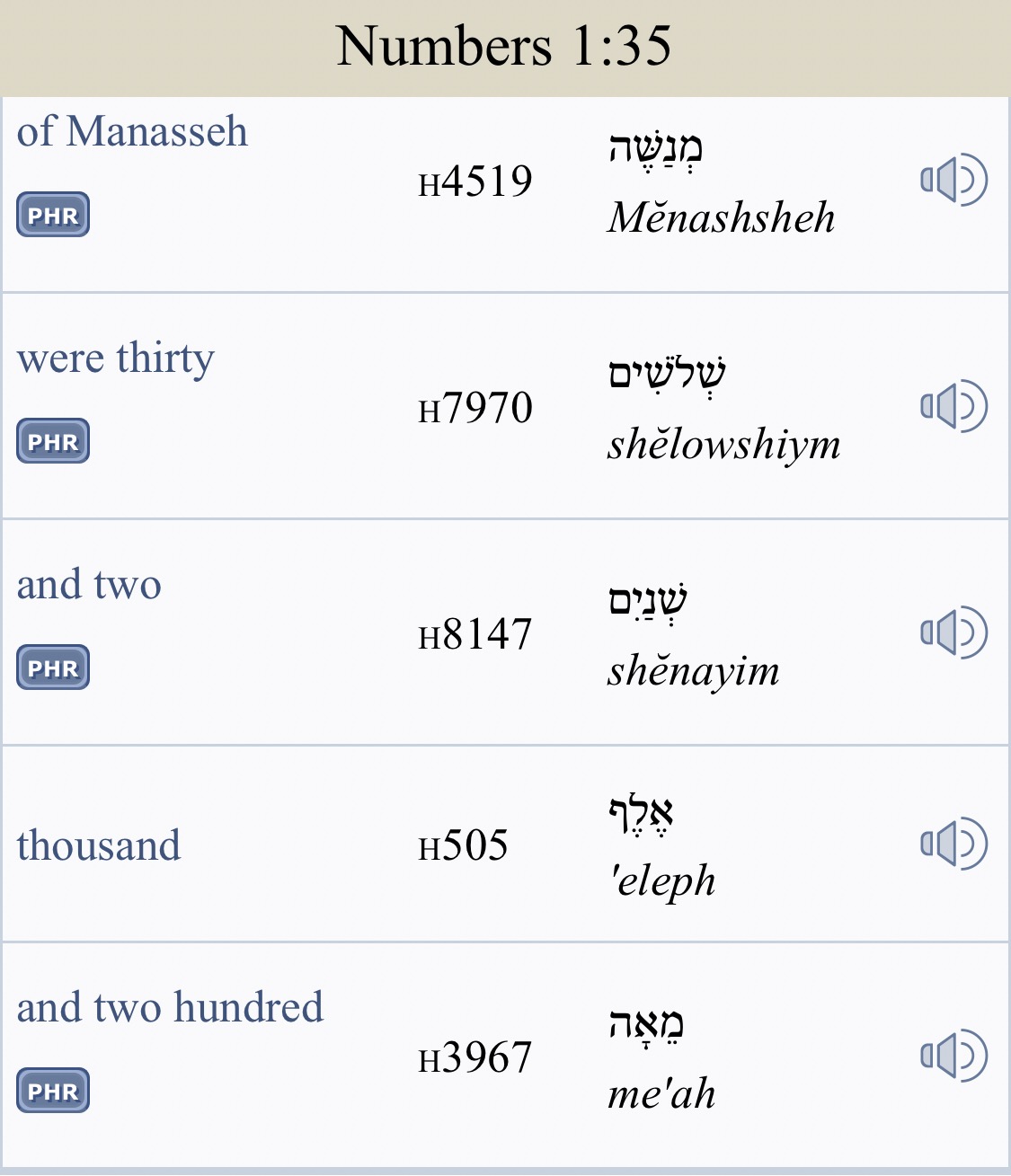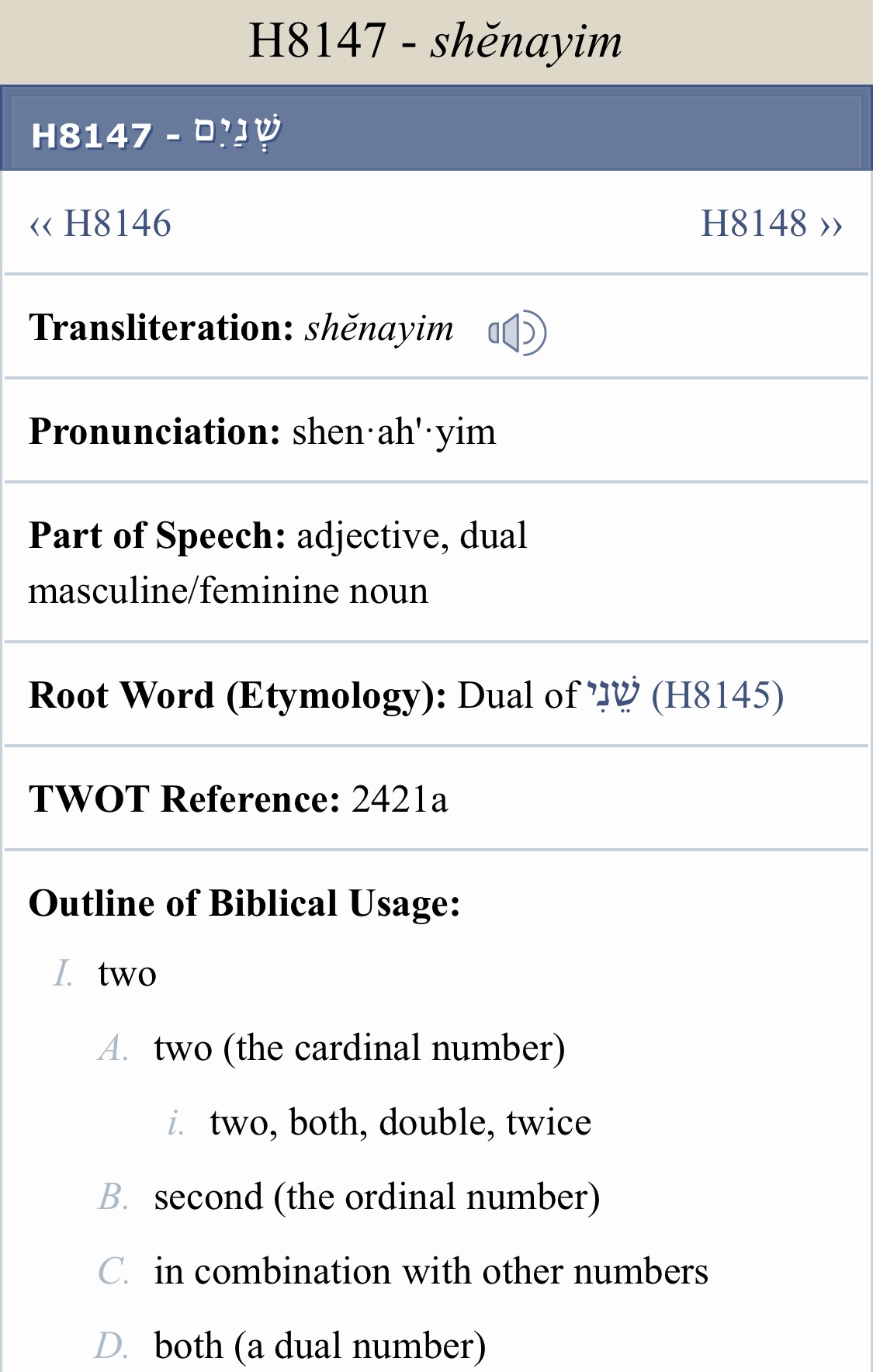A study of the Sabbath and Appointed days of YHVH.
This exegetical study is for the purpose of bringing clarity to what has been concealed and corrupted through translation and church doctrine. And to show that the idea of a “Sunday Sabbath” was never conceived of in the time of these writings.
I would like to begin this study of the Sabbath in the sixth chapter of Luke to show a comparison of the Greek transcripts.
Luke 6:1
“And it came to pass on the second sabbath after the first, that he went through the corn fields; and his disciples plucked the ears of corn, and did eat, rubbing them in their hands.”
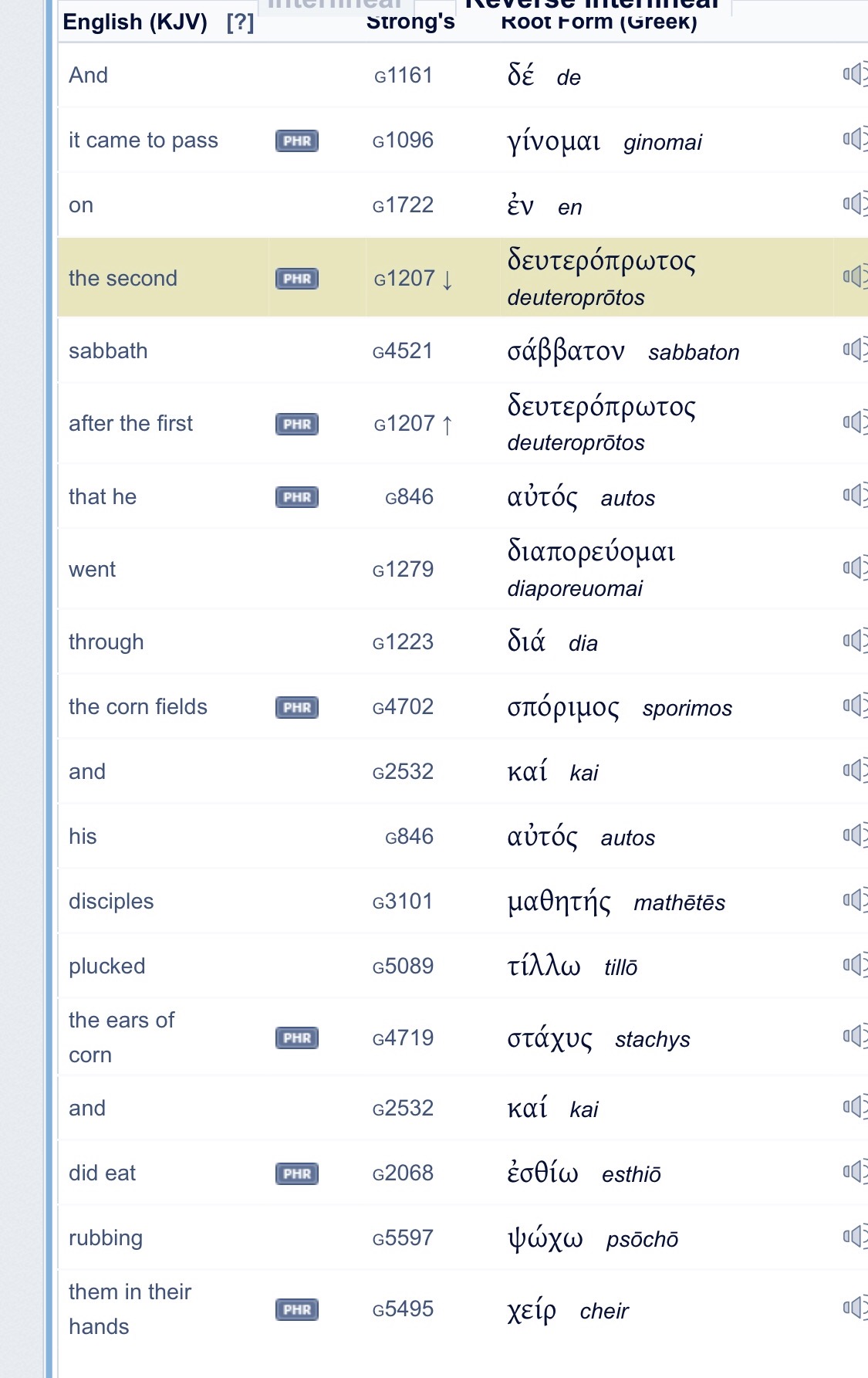
We see here in the reading of Luke 6:1 (deuteroprotos sabbaton deuteroprotos) in the Greek is translated as the second Sabbath after the first. Why? Because from the Jewish perspective they were always in the habit of clocking all things around the “Appointed Times”. What the second Sabbath represents, is the count down of seven Sabbaths to the commanded feast of Pentecost.
As in the Strongs translation below you can see the literal meaning of (dueteroprotos) is the second of the first Sabbaths after the Passover.
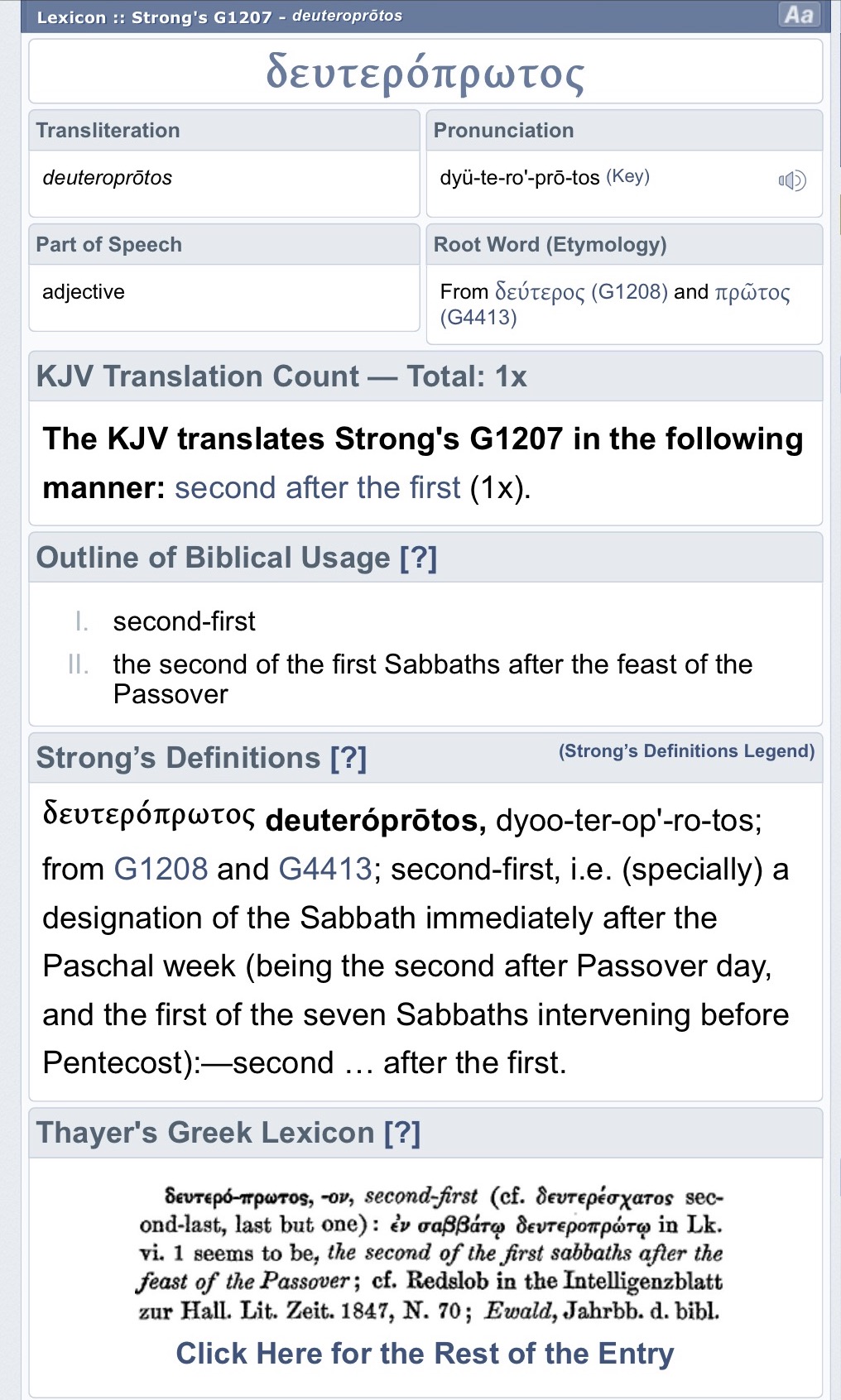
Many have made assumptions as to why the first day of the week should be kept holy giving examples such as what we read in the book of Acts 20:7:
“And upon the first day of the week, when the disciples came together to break bread, Paul preached unto them, ready to depart on the morrow; and continued his speech until midnight.”
Here is the Greek translation to that verse.
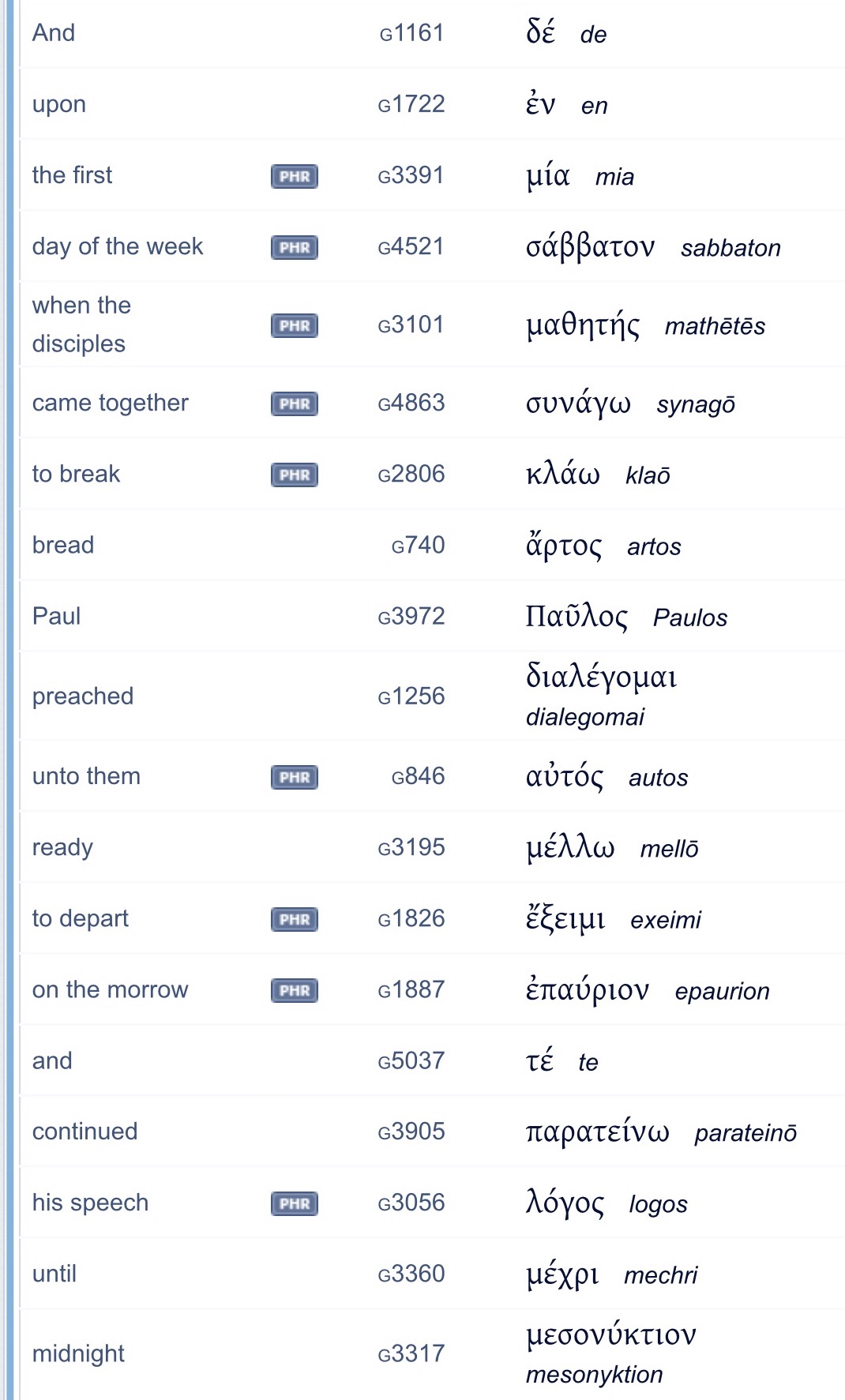
(Mia Sabbaton) is translated as “first day of the week”. If the author of Acts wanted to convey “first day of the week”, he would have used the Greek word (hemera) for the word “day”.
The New Testament was written in the Koine Greek. The words have not changed to this day. The Greek words that would have been used for “first day of the week” in the Koine Greek would have been,
(prote hemera tis hebdomadal)
The Greek word “hepta” means seven. Which is where the Greek word “hebdomadal” comes from which means “week”.
The word for seven and days is used in the verse just above in Acts 20:6
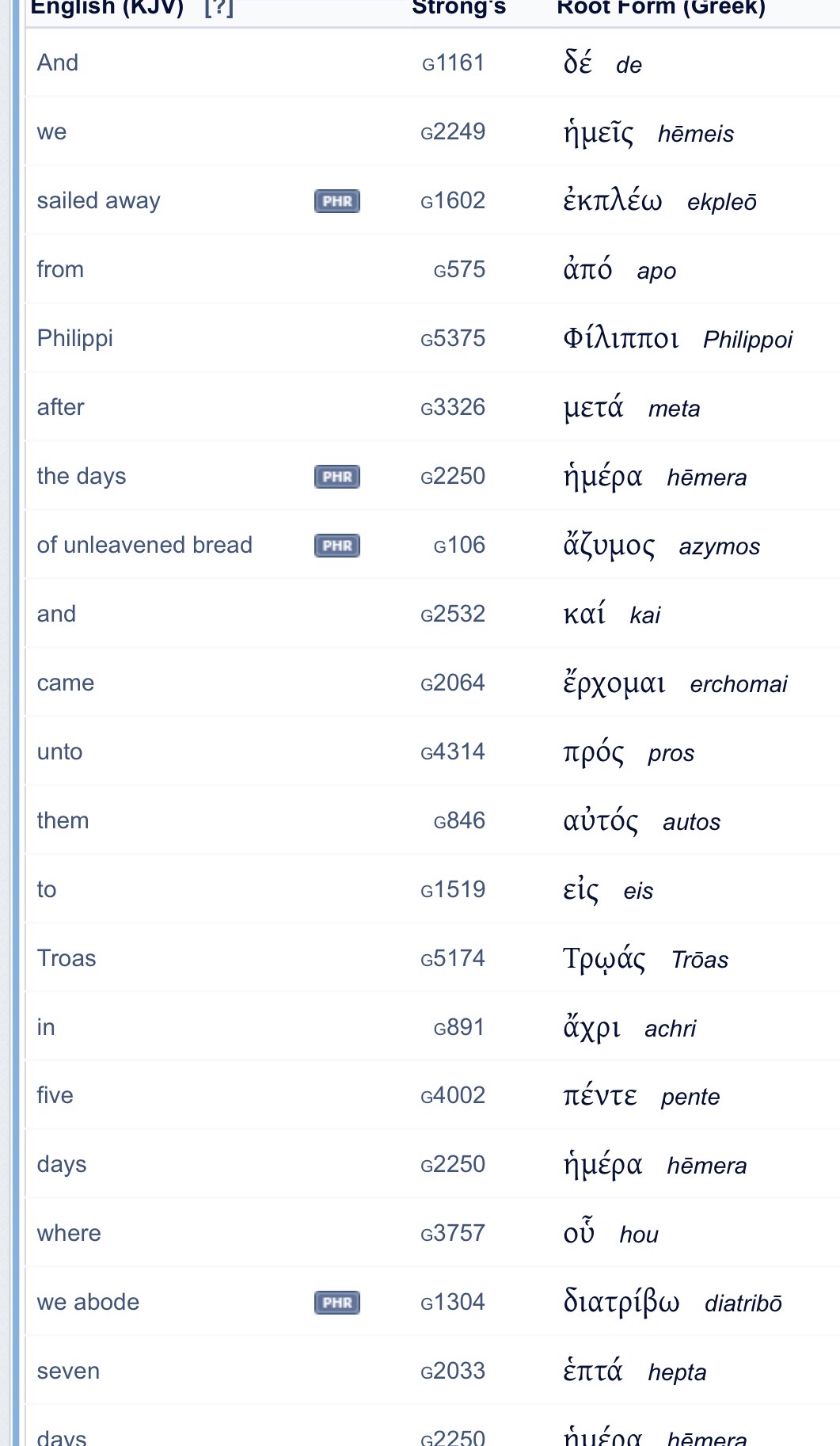
The word (Mia) in the Greek means “One” as in a sequential order. And the word (Sabbaton) means “Sabbath” so the proper translation would be “On the first Sabbath” considering this was just after the days of unleavened bread this would have referred to the counting down of the Sabbaths until Pentecost. Looking again at Acts 20:6 it reads:
“And we sailed away from Philippi after the days of unleavened bread, and came unto them to Troas in five days; where we abode seven days.”
The days of unleavened bread are just after the Passover. To get a better understanding of the time of year and how it relates to the commanded feast days let’s take a look at Leviticus 23
“And YHVH spoke unto Moses, saying, Speak unto the children of Israel, and say unto them, Concerning the feasts of YHVH, which ye shall proclaim to be holy convocations, even these are my feasts.
Six days shall work be done: but the seventh day is the sabbath of rest, an holy convocation; you shall do no work therein: it is the sabbath of the YHVH in all your dwellings.
These are the feasts of YHVH, which ye shall proclaim in their seasons. In the fourteenth day of the first month in the evening is YHVH’s passover. And on the fifteenth day of the same month is the feast of unleavened bread unto the YHVH: seven days you shall eat unleavened bread. In the first day ye shall have an holy convocation: ye shall do no servile work therein. But ye shall offer an offering made by fire unto YHVH seven days: in the seventh day is an holy convocation: ye shall do no servile work therein.
And the YHVH spoke unto Moses, saying, Speak unto the children of Israel, and say unto them, When ye be come into the land which I give unto you, and shall reap the harvest thereof, then ye shall bring a sheaf of the firstfruits of your harvest unto the priest: And he shall wave the sheaf before the YHVH, to be accepted for you: on the morrow after the sabbath the priest shall wave it.
And ye shall count unto you from the morrow after the sabbath, from the day that ye brought the sheaf of the wave offering; seven sabbaths shall be complete: Even unto the morrow after the seventh sabbath shall ye number fifty days”
So we see after the high Sabbath of the first day of unleavened bread there was to be a wave offering and then seven Sabbaths are to be counted, counting down to the day of Pentecost.
This pattern was a for shadowing of Christ as we will see from the gospel accounts.
Isaiah 1:18
“Come now, and let us reason together, saith YHVH:”
We need to establish a few facts between what the scriptures actually say and what has been assumed by many that have lacked the understanding of what is written in the Torah.
As Solomon writes in Proverbs 6:23
“For the commandment is a lamp; and the law is light; and correction in instruction are the way of life:”
If we do not understand and do His commandments how can we be a light (truth) to others? If we don’t have light, we walk in darkness (ignorance)
No where in the scriptures does it say Yeshua was crucified on a Friday. So what day did Yeshua resurrect? This answer hinges on the very reason that 95% of Christians the world over set aside a day of worship that was never commanded. Let the truth be known, scripture tells us that our Messiah was resurrected on the Sabbath.
Compare the following verses from the Concordant literal translation:
Matthew 28
“Now it is the evening of the sabbaths. At the lighting up into one of the sabbaths came Mary Magdalene and the other Mary to behold the sepulcher.”
Mark 16
“And, for the passing of the sabbath, Mary Magdalene and Mary the mother of James, and Salome, buy spices, that, coming, they should be rubbing Him.
2 And, very early in the morning on one of the sabbaths, they are coming to the tomb at the rising of the sun.”
Luke 24
“Now in the early depths of one of the sabbaths, they, and certain others together with them, came to the tomb, bringing the spices which they make ready. Now they found the stone rolled away from the tomb.”
John 20
“Now, on one of the sabbaths, Miriam Magdalene is coming to the tomb in the morning, there being still darkness, and is observing the stone taken away from the door of the tomb.”
The reason the literal translation translated all of these Gospel accounts as Sabbath is because that is what it reads in the Greek (mia ton Sabbaton) sound familiar? Let’s take a journey deeper into the Scriptures and see why the Greek would render it (Sabbath)
Remember the only sign Yeshua would give to that generation, was the sign of Jonah being in the whale’s belly and the period of time he was there.
Matthew 14:40
“For as Jonas was three days and three nights in the whale’s belly; so shall the Son of Man be three days and three nights in the earth.”
Notice the time of year it was, in John 18:28 it records:
“Then they led Yeshua from Caiaphas unto the hall of judgment: and it was early; and they themselves went not into the judgment hall, lest they should be defiled; but that they might eat the passover.”
Then again in John 19:14-15 it reads:
“And it was the preparation of the passover, and about the sixth hour: and he saith unto the Jews, Behold your King! But they cried out, Away with him, away with him, crucify him.”
We see that it was the preparation of the Passover, which takes place in the evening of the 14th day of the first month. The scripture do not leave us without witnesses of the truth. We see the pattern of the perfect story of redemption through the feasts of the YHVH.
Yeshua truly is our Passover lamb which was sacrificed for us on the day of the Passover.
The next day after the Passover meal is the first day of unleavened bread which is a high Sabbath as John also records in John 19:31
“The Jews therefore, because it was the preparation, that the bodies should not remain upon the cross on the sabbath day, (for that sabbath day was an high day,)”
They knew that the body could not remain up on the cross on the high Sabbath day of unleavened bread.
The shadow of this in prophecy was how the Passover lamb was to be eaten at Passover. It was to be roasted with fire and every bit of it consumed that night and none of it was to remain until the morning.
I will show you according to the Torah how the plain text in Greek makes perfect sense.
Mark 16:1 gives us another clue
“And when the Sabbath was past, Mary Magdalene, and Mary the mother of James, and Salome, bought sweet spices, that they might come and anoint him”
The Sabbath that passed was the high Sabbath of unleavened bread. The next day, (which would be ‘Friday’ in today’s calendar) they went and bought the spices and prepared them. This was also known as the preparation day for the ‘weekly’ Sabbath. Then they would rest on the seventh day Sabbath according to the commandment.
Consider, Joseph of Arimathea placed Yeshua in the cave just before sundown, how much more time would the women have needed to go into town to buy spices, and prepare them?
The synoptic gospels show that when Joseph took Yeshua down from the stake, the women followed him to see where he would place the body. They then returned to their homes and observed the high holy day Sabbath, the Passover evening and first day of Unleavened Bread. The day following the Passover meal was the first day of unleavened bread, a holy day in which the shops in Jerusalem would have been closed. The scriptures record the women went and bought spices and oil, and prepared them for use on Yeshua’s body.
The chief priests’ and Pharisees’ own fears and determination to set a watch for three days over the tomb proves that Yeshua did NOT say He would be only two nights and one day in the tomb, but three days and three nights! When those who had Him put to death reminded the Roman authorities of this statement, His tomb was not only sealed, but several Roman soldiers were required to remain there!
Matthew 27:62-65
“Now the next day, that followed the day of the preparation, the chief priests and Pharisees came together unto Pilate, Saying, Sir, we remember that that deceiver said, while he was yet alive, After three days I will rise again. Command therefore that the sepulchre be made sure until the third day, lest his disciples come by night, and steal him away, and say unto the people, He is risen from the dead: so the last error shall be worse than the first. Pilate said unto them, Ye have a watch: go your way, make it as sure as ye can”.
What do we see from all of this? The scriptures clearly state that the day after Yeshua was crucified was the high Sabbath of unleavened bread. It also shows in Mark 16:1 that the women bought and prepared the spices which any market in Jerusalem would have been closed from the evening of the Passover as well as the following day of unleavened bread in which the Torah commands that no work is to be done.
Remember Yeshua said the ONLY sign that would be given to that generation was the sign of Jonah (three days and three nights) Scripture will not contradict itself on such an important point so let’s count and see how this works out in harmony with the text.
The evening of Passover
(the first night)
the day of unleavened bread
(the first day)
The night of the first day of unleavened bread
(the second night)
then was the preparation day for the weekly Sabbath which would have been ‘Friday’
(the second day)
then ‘Friday’ night
(the third night)
then Sabbath morning
(the third day)
Conclusion: The only day we are commanded to remember is the one that has been forgotten. The day that was called the sign of the covenant has been despised. The seventh day was sanctified and made Holy in the beginning. Was reiterated to Israel for forty years in the wilderness when they received a double portion of the manna on the sixth day and upon every seventh day the manna did not fall. YHVH told Moses that it was to be a sign and an everlasting covenant forever, throughout all generations.
Yeshua tells us in Matthew 5 that until heaven and earth pass away, nothing shall be altered in the Torah. Let no one deceive you. The holy One of Israel is the same yesterday today and forever.
